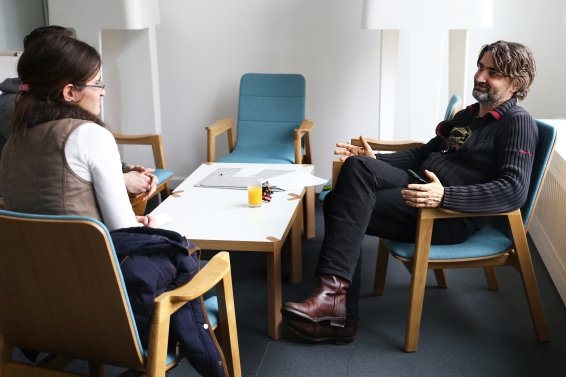The Polish Institute, Berlin
An Interview with Marcin Zastrożny from the Polish Institute Berlin
March 09th, 2016The Polish Institute Berlin was established in 1956 and is part of the Ministry of Foreign Affairs of the Republic of Poland. It embodies the Polish public and cultural diplomacy. The institute moved location several times and since 2004 is located on Burgstraße 27, close to the city centre and opposite Museuminsel.
The task of the cultural institute is to provide and promote Polish culture in Germany but also to raise awareness of the importance of Polish culture as an element of EU cooperation. Besides France, Britain and Spain, Poland is one of the biggest European cultural institutes in Berlin. Part of the institute is also library and gallery. People can find in the library of the Polish Institute more than 40,000 Polish and German books, 600 Polish films and various magazines and newspapers. Currently the Republic of Poland has 25 institutes all around the world, in Germany are three: in Leipzig, Düsseldorf and in Berlin. Katarzyna Wielga-Skolimowska is the director of institute since 2013 and she is also working as deputy Spokesperson of Berlin’s European Union National Institutes for Culture.
In order to get more information about the Polish institute in Berlin, Berlin Global interviewed Marcin Zastrożny, who is responsible for the press and public relations of the Institute.
Can Berlin be considered as a more important city for cultural institutes than other cities?
It is no doubt that Berlin as the capital city of Germany plays an important role in cultural diplomacy and the cultural sphere. Especially the institute in Berlin has changed its location during the history because of the division of Germany and Berlin. The precise location of the polish institute is not so special but because it plays a role in daily life of the people living in Berlin it is important. On the other hand the institutes in Leipzig or Düsseldorf are important for the people living in these cities. The small problem here in Berlin is that people can choose from many different cultural events. However, it is very nice to see that people from Berlin regularly come here and enjoy Polish culture at our many events.
Is the Polish Institute focused on a specific area within the field of culture?
No, not particularly. We are supporting a lot of different cultural events. The Polish Institute pays attention to all cultural branches such as music, art and also theater. However performance is quite an expensive event. The Polish Institute particularly promotes young artists, who want to break through in show business and the artistic world. Most of the artists we work with are younger than 30, but there is no limitation. Some older artists are experienced, famous and skillful and we also work with them.
Does the Institute have anything new or different planned for the future?
Our institute is active in all of the cultural dimensions. Every month we have the honor of introducing in our house different painters or singers. More complicated is to prepare theater performances. The Polish Institute is also a member of EUNIC-Clusters, where we cooperate with other cultural centers. We support multicultural events and we are part of them as sponsors, organizers or participants. Currently, we are preparing special action, where our institute switches location and activities with the Goethe Institute in Warsaw. Afterwards the Goethe Institute will try to continue in our activities and we will do its events.
In your opinion will cultural institutes lose their position in the future?
I would say, no never. Because culture is like a food for people, it makes them happy, they cannot live without culture. Culture builds a special part of life and is a different dimension from economic and politic life. Poland does not plan to open any other centers in Germany since in Germany there are already three. Poland is paying special attention to the institutes in New Delhi and Tokyo, which are very successful in the promotion of Polish culture. Possibly it would be very effective to have other institutes in Latin America as at this time there are none.
News from BerlinVladimira RepaöskŠ, Berlin Global




